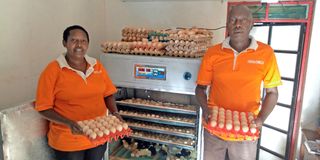Why I quit my job to venture into poultry farming

Ms Elizabeth Mutuku with her husband Peter at their farm in Kitise village, Machakos County.
What you need to know:
- Besides her venture being her main source of income, Elizabeth Mutuku uses the platform to empower other women.
- The proprietor of Pepea Poultry Breeders, discloses that for the last two years, she has trained and empowered more than 400 women.
Elizabeth Mutuku is a dedicated mother to many – right from her three children, employees, to women in her locality. She calls her day a successful one when she believes she has made positive change in someone else’s life.
Ms Mutuku, 43, is a poultry farmer in Machakos County. Besides the venture being her main source of income, it is a platform she uses to empower other women. She has also extended her generosity to the youth.
Born and raised in Kitise Village, Makueni County, Ms Mutuku saw her mother struggle to ensure her and her siblings got an education to secure a bright future.
Acknowledging income generated through poultry is worthwhile, she reveals that when her father died in 1986, her mother sold eggs and chicken to educate them and cater for their basic needs.
“Having been brought up by a single parent, I saw how women struggled to raise their children. Equally, my mother raised us through stipends from poultry,” she explains.
Between 2005 and 2018, Ms Mutuku, who holds a Diploma in Project Management, worked with a non-governmental organisation (NGO) that supported the vulnerable including orphans and street children in Eastern region.
Female beneficiaries
The NGO empowered the target group by offering entrepreneurship training programmes, which entailed agribusiness and poultry management.
“I spearheaded the initiative and after training, we facilitated them to start businesses,” states Ms Mutuku, who worked as a programmes manager before resigning to embark on self-employment.
With most beneficiaries being women, Ms Mutuku learnt a lot.
“Women are co-home keepers and very instrumental in bringing up the family. An empowered woman is an empowered society,” she emphasises.
Ms Mutuku recalls an incident in 2016 during one of the home visits in Misakwani village, where they found a family hooked to drugs and alcohol abuse. From the father to his four, they were all drug addicts and at one point, the only daughter in the family got pregnant at a tender age, she narrates.

The couple with some of the chicks they rear.
Sadly, the man of the house did not even notice his daughter’s bulging stomach.
The girl, Ms Mutuku adds, really suffered because in her household, her mother had been dis-empowered so much she could not protect her own daughter.
“The poor girl later gave birth and the baby died,” she says.
Ms Mutuku realised that poverty was the main contributor to the unfortunate situation the state of the family.
“If the family had been empowered, particularly the mother, probably by enabling her engage in an income-generating activity, things would have been different,” she explains.
Thanks to the NGO she worked for at the time, Ms Mutuku says the woman was eventually enrolled in an empowerment programme that turned the tide for her.
Her husband and sons were later put into a rehabilitation programme.
Sustainable ventures
Besides engaging in poultry, where she hatches eggs, broods chicks and rears layers, Ms Mutuku also offers training to women who wish to engage in poultry farming, at no cost.
Attesting to the reward of the venture, Ms Mutuku also trains youths.
The proprietor of Pepea Poultry Breeders, discloses that for the last two years, she has trained and empowered more than 400 women.
She says her training benefited 500 youths last year as many looked for sustainable ventures to stay afloat during the Covid-19 pandemic that paralysed business and the education calendar.
One of her employees is among the beneficiaries of her programme.
“I have benefited through Ms Mutuku’s diligence in empowering women and youths. She facilitated me with more than 100 chicks, which are currently laying eggs and earn me extra income,” says 21-year-old Jennifer Muteti, the office assistant.
“All we need to do is empower each other as women through the ventures or careers we are into. Eventually, society will come out of poverty. We have a role to play in ensuring we support each other in our small way,” advices Ms Mutuku.





